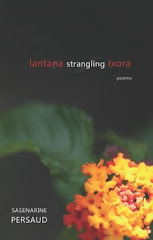
For the first time in more than 20 years, a public comment on the Guyana Prize for Literature. But first, a disclaimer: As I write (August 27, 2011) the shortlist for the Guyana Prize for literature has just been announced and my collection,
In a Boston Night has been one of the books shortlisted; by my count, my books have been shortlisted at least 5 times for this prize, which I have never won; and some, no doubt, may consider it uncharitable to say that several of the judges in the years in which my work was shortlisted are people with whom I have had differences of opinion, publicly and privately, relating to aesthetics and art—Indian aesthetics in my work; art as yoga; Yogic Realism, as I define my aesthetics; and the politics of literature following the tumultuous politics of Guyana in general and race in the Caribbean and elsewhere—largely to critics and professors schooled and steeped, if not blinded, by Euro-American aesthetics and ways of seeing the world; neo-colonialists, some may say.
I learned of the shortlist by email from the Guyana Prize Committee less than 7 days ago. A quick search of the Internet showed that others were privy to this list well before many of those shortlisted, or their publishers. A quick search of the Internet also showed that almost all of those commenting on the shortlist chose to ignore the Guyana Prize shortlist and deal with the Caribbean Award shortlist. It is this award, the Caribbean component of the Guyana Prize, I comment on today. A comment on the Guyana Guyana Prize for Literature will come later.
In a sentence: The Guyana Prize for Literature Caribbean Award should be discontinued and the more than $20,000.00 US expended on this prize should be given directly to Guyanese writers and artists in a juried granting system as used by Canada, the US and other countries. For one, there are already two Caribbean Literature awards: The BOCAS PRIZE, and the venerable, if irregular, Cuban CASAS DE LAS AMERICAS AWARD, which is open to works in English from the Caribbean and South America. Secondly, The Guyana Prize for Literature was established to promote writing by Guyanese writers at home and abroad. The Guyana Prize partially accomplishes this; a Caribbean Award does not further this intent of the award—we will, for now, bypass the politics of the establishment of the prize by the post-Burnham regime of the PNC. Fourthly, because of the dynamics of writing and publishing facilities on craft abroad, the Guyana Prize has tended to be of greater value to writers living abroad. A juried grants program which gives writers, painters, song-writers etc., living in Guyana, the space and time to focus on their art is the most effective way to ensure that local writers/artists etc. nurture, develop and perfect their art.
If there needs to be another literary award for Caribbean writers, this could be a project for CARICOM, or a collective project by the governments of the region, or a project of the University of the West Indies. But not an award supported entirely by the government of Guyana, while its own writers and artists are neglected. Charity begins at home—the Guyana Prize Caribbean Award is a contradiction of this when more than $20,000.00 US is being spent on an award with no direct benefit to writers and artists in Guyana. This is obscene. Especially given that Guyana is considered one of the poorest countries in the region and the world. Add another $20,000.00 US to $30,000.00 US for the Guyana Prize (Guyana component—see how ridiculous this has become even in nomenclature, with the Guyana Prize Caribbean Award) and this seems doubly obscene. The Guyana Prize is of value for both Guyanese writers at home and abroad and for the Guyanese nation. And, yet, perhaps, the Guyana Prize, too, needs to be reconfigured. This is a topic for another time.
My focus now is the Guyana Prize Caribbean Award, which should be abolished. This iteration of this prize seems to be the result of intense lobbying—a euphemism for bullying, some say—by a Nobel laureate and several Caribbean writers, based outside Guyana, during the 2008 Festival, coupled with some politics; a President not eligible for reelection looking at his legacy? Another disclaimer: I’ve never been a member of any political party in any of the 3 countries in which I hold citizenship; I am still not a member of any political party.
The Guyana Prize Caribbean Award, in the absence of a juried grants program for local writers, is a mistake and an affront to Guyanese writers/artists at home—and abroad. It should be scrapped and the funds earmarked should be funneled to writers/artists etc. living in Guyana.















